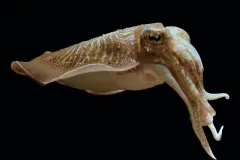So You Think You're Smarter Than a Cephalopod?

The blanket octopus can rip a poisonous tentacle from a Portuguese man-o-war and wield it like a sword to ward off enemies as it soars through the ocean trailing its webbed cloak behind it.
Vampyroteuthis infernalis, the vampire squid from hell, has been egregiously misnamed. This poor little thing – more like a wallflower or a tumbleweed than a devil from hell – is sometimes reduced to defending itself by biting off its own arm tip. Then the tip floats off, sparkling its blue lights in the darkness and luring away the enemy.
The giant Pacific octopus with its eight huge arms can pass a baseball or golf ball all the way down its arm, from sucker to sucker, with apparent ease, like the way we grasp small items with our thumb and forefinger. If you’re feeding them, beware. All those suckers can easily grab the food pan and carry it away. And they have a lot more suckers than you have fingers and thumbs.
Octopus dexterity is a thing of awe. One veterinarian saw an octopus undo its own surgical sutures. Divers off the Pacific Northwest Coast have seen male octopuses stand on undersea rocks in the cold salt water, stretching two arms out before them like antennae, apparently searching for that perfect female.
Cephalopods – squid, octopus, cuttlefish and nautiluses – have been around for millions of years. The word "cephalopod" means "head-foot." Some scientists believe that we humans separated from cephalopods, evolutionarily speaking, perhaps more than 700 million years ago. That’s hundreds of millions of years before the Cambrian Explosion, when so many life forms radiated throughout our planet’s oceans.
Given that long divergence, we should be very different species. And we are. In some ways. Cephalopods are invertebrates, animals without skeletons. They usually have eight arms, some have a couple tentacles too. These appendages attach not to the main body; instead, they encircle the animal’s mouth like some kind of living beard. Many cephalopods can change the color of their skin almost instantaneously. Some, like the fabulous cuttlefish, look like flashing neon lights.
These guys are weird.
And yet – they are a lot like us, in some very basic ways. For one thing, we both have similar brain cells. For almost 100 years, scientists have used the giant axon of a little squid, Loligo pealeii, to study how our own brains work. In most animals, the neuron is the cell that’s the central processor of the world outside the body. The neuron has a main body and an axon, a long thin living tube that extends from the main body somewhat like a thread or a wire.
Our own axons are gossamer-like, delicate and easily damaged. It’s difficult for researchers to work with them. But the little squid’s axons may be as thick as a pencil lead. They are visible to the naked eye and are easily handled. By studying how the squid axon works, scientists have learned quite a bit about how ours function. They hope to apply some of what they’ve learned to finding cures for diseases like Alzheimer’s.
Recently, as our understanding of cephalopods has improved, we’ve begun to wonder: Are these animals intelligent? It depends on how you define "intelligence."
James Wood, a teuthologist (cephalopod scientist), imagined creating an intelligence test for humans, by an octopus:
“So the octopus thinks: ‘All right. I’m going to make an intelligence test for humans, because they show a little bit of promise, in a very few ways.’ And the first question the octopus comes up with is this: How many color patterns can your severed arm produce in one second?”

